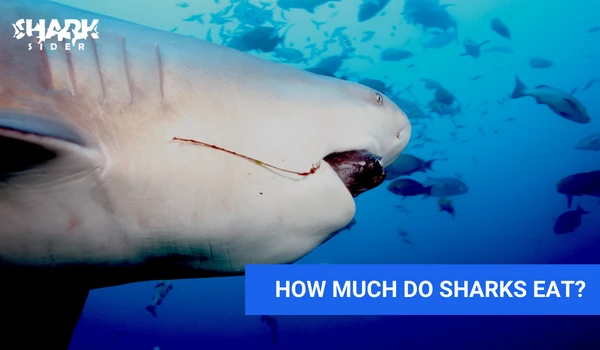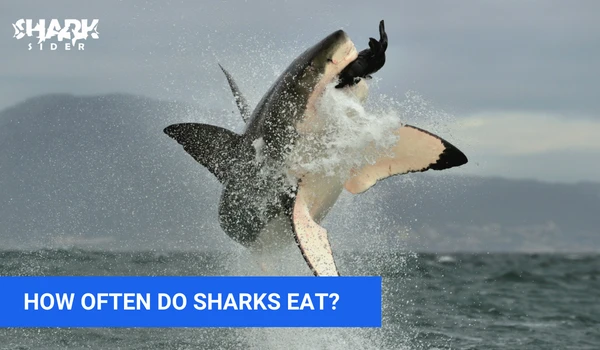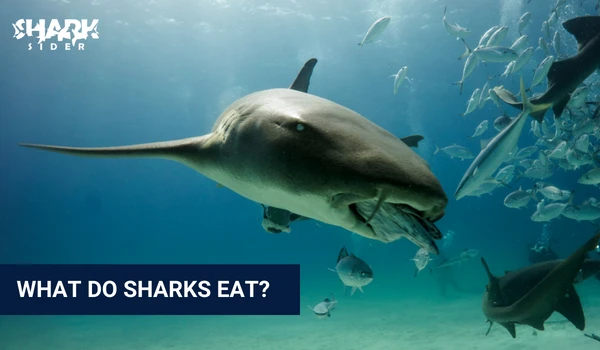Are you curious to learn more about the diet and feeding habits of sharks? Sharks are one of the top predators in our oceans, but what does sharks eat? From sardines to sea turtles and even other smaller shark species, this blog post will explore the diverse diet of these magnificent ocean creatures. So read on to find out why some shark species have such a wide variety of prey, how they catch their meals, and much more about what makes up a typical shark’s meal plan.
What do sharks eat? Sharks hunting and feeding habits
Sharks are one of the most diverse groups of fish, with more than 480 known species. They can be found in nearly every ocean environment and range from very small to extremely large sizes. Despite their wide range of size and habitat, sharks have very similar feeding habits. In general, they tend to be opportunistic hunters that feed on whatever prey is most abundant in their particular environment.
Most sharks are ambush predators and rely on surprise to capture their prey. They will hide in the sand or behind coral reefs and wait for unsuspecting fish, turtles, crabs, and other animals before quickly attacking them with a burst of speed. Some species can reach incredible speeds of up to 25 miles per hour when feeding!
So, what eats a shark? Shark also has an incredibly varied diet. Sharks can consume anything from small fish and crustaceans to large sea turtles, whales, and even other shark species. Some of the most common prey items for sharks include bony fishes (like herring, tuna, and mackerel), squids, crabs, and other crustaceans, and occasionally sea turtles and marine mammals.
How much do sharks eat?

Sharks have different feeding habits depending on their size, species, and location. Generally speaking, smaller sharks consume smaller prey while larger sharks eat larger prey items. Some sharks will even feed on carrion (dead animals).
Adult sharks generally need to consume between 2% – 5% of their body weight per day in order to stay healthy and active. For example, an adult Tiger shark can consume up to 300 pounds of food per day!
Young sharks tend to feed more frequently than adults, often multiple times a day. This is because they are trying to grow quickly and need lots of food for energy. Juvenile sharks typically require about 10% – 20% of their body weight per day in order to grow and develop.
How often do sharks eat?

Sharks can go for both short and long periods of time without eating. Some species are known to fast for weeks or even months when food is scarce. It also depends on the species; some eat multiple times a day, while others may feed only once a week or once every few weeks.
Finally, sharks have also been known to migrate long distances in search of food. It’s believed that some species may travel thousands of miles in order to find a more abundant source of prey.
Overall, the diet and feeding habits of sharks are incredibly varied and complex. With such a wide range of sizes, habitats, and prey items available, it’s no wonder why this top predator remains one of the most successful hunters in our oceans!
What do carnivorous sharks eat? The diet of carnivorous sharks
Carnivorous sharks, like the Great White shark and Bull shark, prefer to feast on larger prey items such as other fish, sea turtles, seals, and dolphins. They have powerful jaws with razor-sharp teeth that can easily tear apart their meals. To help them locate potential food sources they use their excellent senses of smell and hearing.
What do omnivorous sharks eat? The diet of omnivorous sharks
Unlike carnivorous sharks which feed solely on animals, omnivorous sharks will eat both animal and plant matter. The Bonnethead shark is one example of an omnivore; it enjoys a diet of clams, crabs, mollusks, algae, and seagrasses. While most omnivorous sharks will still primarily focus on animal prey, they might also take advantage of any edible plant matter in the area.
What do filter feeders eat? The diet of filter-feeding sharks
The Whale shark and Basking sharks are two species that rely on filter feeding to obtain their food. They swim with their huge mouths wide open, filtering out tiny plankton and krill particles from the surrounding water. These slow-moving animals need large amounts of these microscopic organisms to sustain themselves, so they often linger near ocean upwellings where nutrient-rich waters rise from the depths.
What do planktivorous sharks eat? The diet of planktivorous sharks
Planktivorous sharks are those that feed exclusively on plankton, like the little and the bramble shark. They have long, slender mouths that help them strain out tiny crustaceans, jellyfish, and other microscopic organisms from the water column.
As you can see, no matter which type of shark you’re talking about, they all need to eat in order to survive and thrive. By understanding their diets we can better appreciate these incredible animals and ensure their protection for future generations to come.
Do sharks eat humans?
The simple answer is no, sharks do not typically eat humans. While some species may be more aggressive towards people than others, the vast majority of sharks are not a threat to humans. In fact, most attacks on humans by sharks are due to mistaken identity or curiosity rather than an intention to harm us.
Do sharks eat sharks?
Yes, some species of shark will occasionally consume other sharks as part of their diet. The Great White shark is one example – it has been known to hunt smaller species such as Dogfish and Smooth-Hound sharks. In addition, larger Whale sharks may feed on juvenile versions of their own species from time to time. However, these occurrences are rare and cannibalism is not the main source of nutrition for sharks.
Conclusion
Sharks have an important role in the marine environment, and understanding their dietary requirements is essential to our conservation efforts. Their diet varies depending on the species and ranges from strictly carnivorous to omnivorous. We also know that sharks do not typically eat humans, and cannibalism is not a major part of their diet. Through our research, we can better appreciate these majestic animals and ensure their protection for future generations to come.

